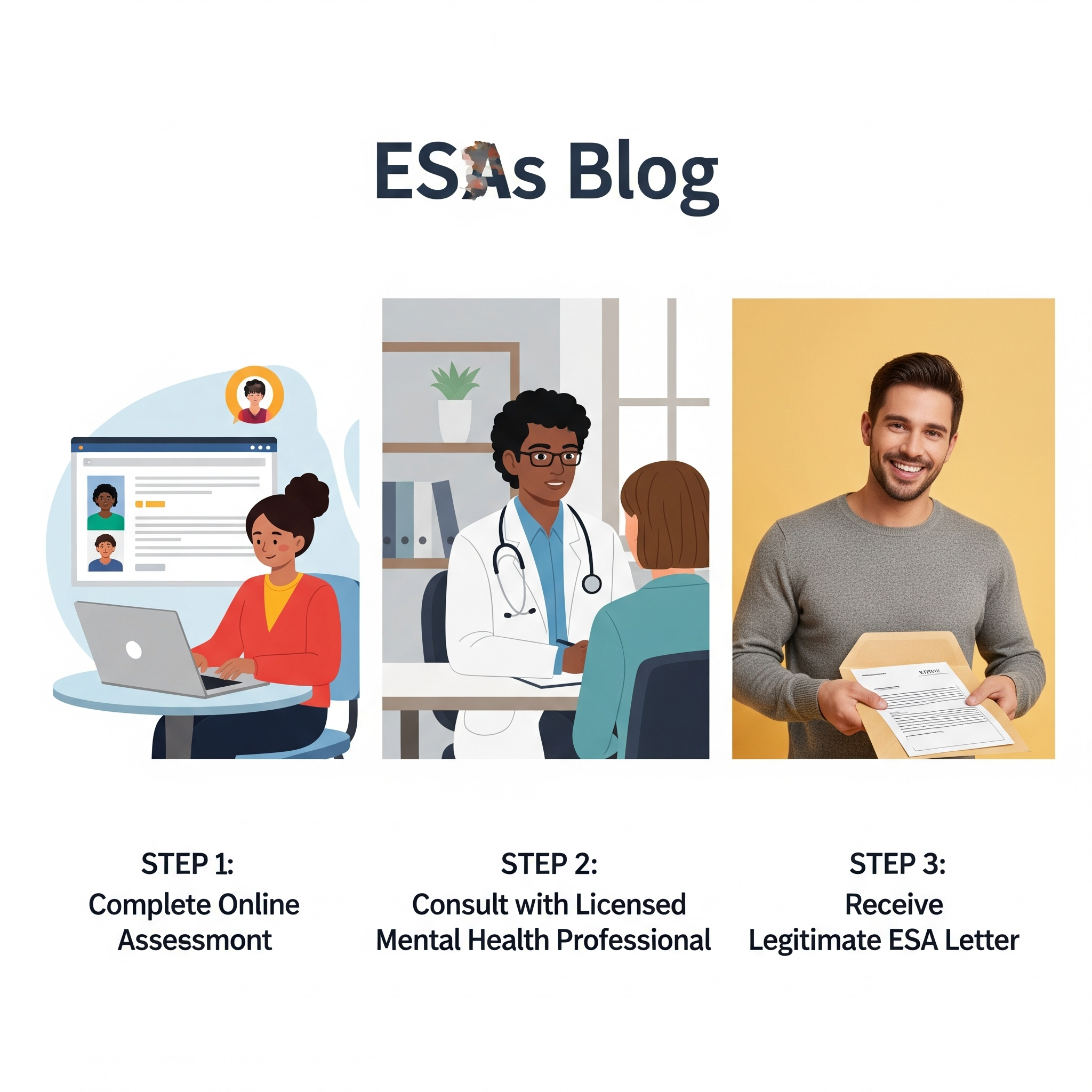For individuals navigating the complexities of mental health disabilities, a Psychiatric Service Dog (PSD) can offer more than just companionship – they provide critical, task-specific support that can profoundly enhance independence and quality of life. Unlike Emotional Support Animals (ESAs), which offer comfort through their presence, PSDs are highly trained to perform specific tasks that directly mitigate symptoms of their handler’s mental health condition. If you believe a PSD could be a vital part of your treatment plan, understanding how to obtain a legitimate PSD letter online is your crucial first step. CertifyESA is dedicated to providing a secure and ethical pathway to connect with licensed mental health professionals (LMHPs) who can assess your needs and, if appropriate, issue a valid PSD letter.
The Foundation: Understanding Psychiatric Service Dogs and Their Legal Standing
Before you seek a PSD letter, it’s essential to grasp what a PSD truly is under federal law. The Americans with Disabilities Act (ADA) defines a service animal as a dog (or miniature horse, in some cases) that is individually trained to do work or perform tasks for the benefit of an individual with a disability, including a physical, sensory, psychiatric, intellectual, or other mental disability. (U.S. Department of Justice, n.d.).
Key distinctions of a PSD:
- Task-Oriented: A PSD must be trained to perform specific tasks directly related to mitigating the handler’s mental health disability. Simple emotional comfort is not enough. Examples include reminding to take medication, interrupting self-harming behaviors, providing deep pressure therapy (DPT) during anxiety attacks, or scanning for triggers.
- Public Access Rights: Due to their specialized training, PSDs are generally allowed to accompany their handlers in public places where pets are typically prohibited, such as restaurants, stores, and transportation.
- No Certification or Registration Required by Law: The ADA does not require service animals to be professionally trained, certified, or registered. However, having a legitimate letter from an LMHP confirming your disability and the need for a task-trained service animal can be invaluable for various situations, especially air travel under the Air Carrier Access Act (ACAA).
Why an Online PSD Letter Service?
The internet offers a convenient and often more accessible way to connect with licensed professionals who can assess your eligibility for a PSD. For many, finding a local LMHP who understands service animal laws and is comfortable issuing such documentation can be challenging. Online services like CertifyESA bridge this gap, offering:
- Accessibility: Connect with LMHPs from the comfort and privacy of your home, regardless of geographical limitations.
- Specialization: Online platforms often partner with LMHPs who have specific expertise in assessing the need for assistance animals.
- Efficiency: Streamlined processes can lead to quicker assessments and, if approved, faster delivery of your letter.
However, the online landscape also has its pitfalls. The rise of “ESA mills” that offer illegitimate letters without proper assessment has unfortunately created skepticism. This makes choosing a reputable and ethical online provider like CertifyESA paramount.
Your Step-by-Step Guide to Getting a Legitimate PSD Letter Online with CertifyESA
At CertifyESA, we prioritize clinical integrity and legal compliance to ensure you receive a legitimate PSD letter based on a thorough and ethical evaluation.
Step 1: Understand Your Needs and PSD Requirements
- Self-Assessment: Before you begin, honestly reflect on your mental health condition. Does it substantially limit one or more major life activities (e.g., working, sleeping, socializing, managing personal safety)?
- Identify Specific Tasks: Think about how a PSD could specifically help mitigate your symptoms. Can you identify concrete tasks (e.g., retrieving medication, interrupting panic attacks, guiding you through a crowd) that your dog could be trained to perform? Remember, emotional comfort alone is not a qualifying task for a PSD.
- Commitment to Training: Understand that while you can owner-train your PSD, the dog must be trained to perform these tasks and be well-behaved in public. A legitimate letter confirms your need for a PSD, it doesn’t certify your dog’s training.
Step 2: Complete CertifyESA’s Online Screening Questionnaire
- Action: Visit the CertifyESA website and initiate the process by completing our secure online questionnaire. This form will ask detailed questions about your mental health history, your current symptoms, how these symptoms impact your daily life, and how you believe a PSD’s tasks could specifically assist you.
- Why it’s important: This comprehensive questionnaire is designed to gather the preliminary information an LMHP needs to assess your situation. It’s the first step in demonstrating a legitimate need. Be thorough and honest.
Step 3: Consultation with an LMHP
- Action: Based on your questionnaire, CertifyESA will connect you with a licensed mental health professional (LMHP) who is licensed to practice in your state. You will then schedule and complete a tele-health consultation (via video or phone call) with this professional.
- Why it’s important: This direct, live interaction is the cornerstone of a legitimate assessment. The LMHP will:
- Conduct a Clinical Evaluation: They will discuss your answers from the questionnaire in more detail, ask follow-up questions, and evaluate your mental health condition against diagnostic criteria (e.g., from the DSM-5, American Psychiatric Association, 2013).
- Assess Functional Limitations: The LMHP will determine if your disability substantially limits one or more major life activities.
- Verify Need for Task-Specific Assistance: Crucially, they will ascertain if a PSD’s specific, trained tasks are medically necessary to alleviate symptoms or assist with functional limitations directly caused by your disability. This distinguishes a PSD from an ESA.
- Confirm Your Capacity: The LMHP may also consider your capacity to care for and manage a service animal.
Step 4: Receive Your Legitimate PSD Letter (If Clinically Recommended)
- Action: If, following the comprehensive evaluation, the LMHP determines that you meet the criteria for a mental health disability that requires the assistance of a PSD for task-specific support, they will issue a legitimate PSD letter.
- What a Legitimate PSD Letter Includes:
- LMHP’s Credentials: Full name, license number, type of license, and the state in which they are licensed to practice.
- Official Letterhead: The letter should be on the LMHP’s professional letterhead.
- Confirmation of Disability: A statement that you have a mental health disability that substantially limits one or more major life activities. (Note: The letter does not need to disclose your specific diagnosis, only that you have a qualifying disability.)
- Recommendation for PSD: A clear statement that a Psychiatric Service Dog is medically necessary to provide tasks that mitigate symptoms related to your disability.
- Date: The date the letter was issued.
- Signature: The LMHP’s signature.
- Delivery: CertifyESA ensures secure and timely digital delivery of your legitimate PSD letter upon approval.
Step 5: Understand Legal Rights and Ongoing Responsibilities
- ADA Rights: Your PSD letter helps validate your need for a service animal under the ADA. Remember that businesses can only ask two questions: 1) Is the dog a service animal required because of a disability? 2) What work or task has the dog been trained to perform? They cannot ask about your disability, demand documentation (like your letter, except for specific air travel requirements), or ask the dog to demonstrate its tasks. (U.S. Department of Justice, n.d.)
- ACAA for Air Travel: For air travel, the Department of Transportation (DOT) requires specific forms (Service Animal Air Transportation Form) attesting to the animal’s health, behavior, and training, and potentially another form for long flights (8+ hours) regarding relief. While a direct “letter” isn’t explicitly required by the ACAA for all situations, having an LMHP’s confirmation of your disability and the need for a task-trained animal can be part of this process or simply beneficial to present. (U.S. Department of Transportation, n.d.)
- Fair Housing Act (FHA): Although the FHA primarily addresses ESAs, a PSD also falls under its protections for housing accommodations if they are needed due to a disability. Landlords generally cannot charge pet fees or deposits for service animals.
- Ongoing Training & Control: You are responsible for ensuring your PSD is always under your control (leashed, harnessed, or by voice/signal) and is housebroken. Disruptive behavior can lead to exclusion.
- Responsible Ownership: Providing for your PSD’s well-being, including veterinary care, nutrition, and exercise, is an ongoing commitment.
Why Choose CertifyESA for Your Legitimate PSD Letter?
- Ethical Practices: We do not “sell” PSD letters. We facilitate a legitimate clinical evaluation by a licensed professional who will only issue a letter if a genuine medical need is determined.
- Licensed & Qualified Professionals: Our network comprises LMHPs who are licensed in your state and understand federal disability laws.
- Comprehensive Assessment: Our process is designed to be thorough, ensuring a valid and defensible recommendation.
- Privacy & Security: Your personal and medical information is handled with the utmost confidentiality and security.
- Client Support: Our team is available to guide you through every step of the process.
Conclusion: Empowering Your Journey to Independence
Obtaining a legitimate PSD letter online is a crucial step for individuals seeking the unique, task-based support of a Psychiatric Service Dog. By choosing a reputable and ethical service like CertifyESA, you ensure that your journey begins with a thorough, professional evaluation by a licensed mental health professional. This empowers you with the necessary documentation to assert your rights under federal law, allowing your PSD to provide the invaluable assistance you need to navigate life with greater independence, stability, and well-being.
References:
American Psychiatric Association. (2013). Diagnostic and statistical manual of mental disorders (5th ed.).
U.S. Department of Justice. (n.d.). ADA Requirements: Service Animals. Retrieved from https://www.ada.gov/resources/service-animals-faqs/
U.S. Department of Transportation. (n.d.). Service Animals. Retrieved from https://www.transportation.gov/resources/individuals/aviation-consumer-protection/service-animals





